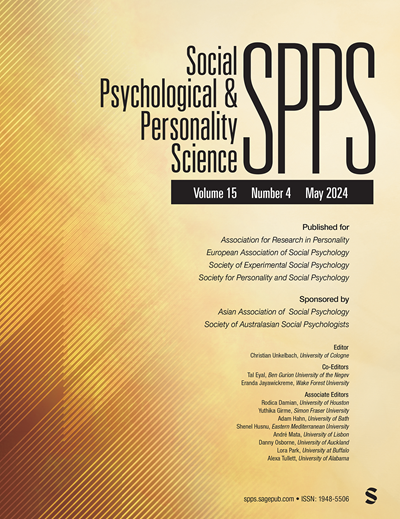当少即是多:防御性国家认同预测群体内利益牺牲以最大化群体间差异
IF 3.3
2区 心理学
Q1 PSYCHOLOGY, SOCIAL
引用次数: 0
摘要
我们认为,防御性的身份形式(即民族主义和民族自恋)会通过倾向于最大化自己和其他群体在资源分配方面的差异来损害国家。我们通过采用经典的社会心理学范式,即Tajfel矩阵,对COVID-19背景下设计的现实场景进行检验。我们将这种差异最大化定义为:一国相对于其他国家获得更多医疗资源的偏好,但代价是绝对的集团内部利益。在研究1和2中,国家认同的防御性预测了这种适得其反的策略,最终对内群体和外群体都没有好处。在实验研究3中,诱导群体内劣势导致了更大的差异最大化倾向。研究结果提供了证据,表明防御性的国家认同可能会支持那些提供积极的群体间比较的政策,但同时也会损害自己的内部群体。本文章由计算机程序翻译,如有差异,请以英文原文为准。
When Less Is More: Defensive National Identity Predicts Sacrifice of Ingroup Profit to Maximize the Difference Between Groups
We propose that defensive forms of identity (i.e., nationalism and national narcissism) can harm the nation through a tendency to maximize the difference between own and other groups in resource allocation. We test this hypothesis by adopting a classic social psychological paradigm, the Tajfel’s matrices, to real-life scenarios designed in the COVID-19 context. We captured maximizing the difference as a preference for one’s nation being allocated more medical resources relative to other countries, but at the expense of absolute ingroup profit. In Studies 1 and 2, defensiveness in national identity predicted this counterproductive strategy that ultimately benefits neither ingroup nor outgroup. In experimental Study 3, inducing ingroup disadvantage led to a greater tendency to maximize the difference. The results provide evidence that defensive national identity might be liked to support for policies that offer a positive intergroup comparison, but simultaneously harm one’s own ingroup.
求助全文
通过发布文献求助,成功后即可免费获取论文全文。
去求助
来源期刊

Social Psychological and Personality Science
PSYCHOLOGY, SOCIAL-
CiteScore
12.50
自引率
1.80%
发文量
77
期刊介绍:
Social Psychological and Personality Science (SPPS) is a distinctive journal in the fields of social and personality psychology that focuses on publishing brief empirical study reports, typically limited to 5000 words. The journal's mission is to disseminate research that significantly contributes to the advancement of social psychological and personality science. It welcomes submissions that introduce new theories, present empirical data, propose innovative methods, or offer a combination of these elements. SPPS also places a high value on replication studies, giving them serious consideration regardless of whether they confirm or challenge the original findings, with a particular emphasis on replications of studies initially published in SPPS. The journal is committed to a rapid review and publication process, ensuring that research can swiftly enter the scientific discourse and become an integral part of ongoing academic conversations.
 求助内容:
求助内容: 应助结果提醒方式:
应助结果提醒方式:


